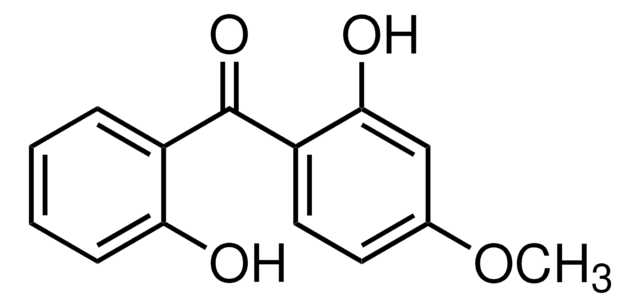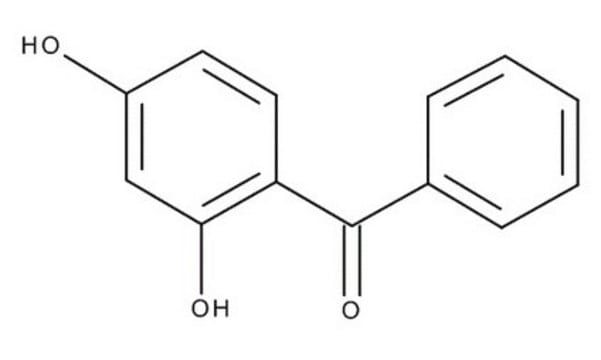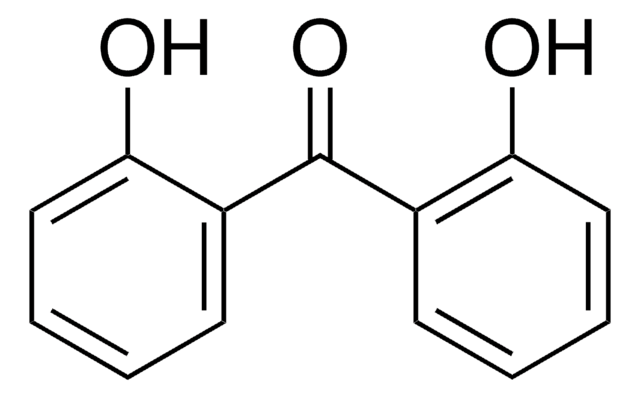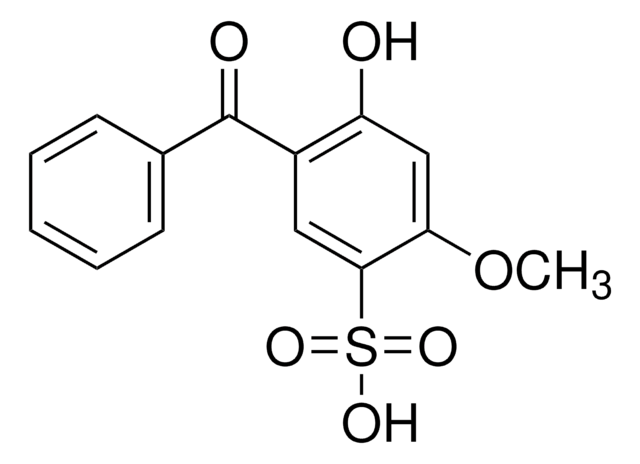About This Item
Recommended Products
assay
97%
mp
198-200 °C (lit.)
SMILES string
Oc1ccc(c(O)c1)C(=O)c2ccc(O)cc2O
InChI
1S/C13H10O5/c14-7-1-3-9(11(16)5-7)13(18)10-4-2-8(15)6-12(10)17/h1-6,14-17H
InChI key
WXNRYSGJLQFHBR-UHFFFAOYSA-N
Looking for similar products? Visit Product Comparison Guide
Related Categories
Application
- Urinary concentrations of bisphenol A, parabens and benzophenone-type ultra violet light filters in relation to sperm DNA fragmentation in young men: A chemical mixtures approach.: This study investigates the relationship between urinary concentrations of various chemicals, including benzophenone-type UV filters like 2,2′,4,4′-Tetrahydroxybenzophenone, and sperm DNA fragmentation. The findings highlight potential reproductive toxicity risks associated with exposure to these compounds (Kiwitt-Cárdenas et al., 2024).
- Salting-out assisted liquid-liquid extraction combined with LC-MS/MS for the simultaneous determination of seven organic UV filters in environmental water samples: method development and application.: This paper discusses the development of a method for detecting organic UV filters, including 2,2′,4,4′-Tetrahydroxybenzophenone, in environmental water samples. The method offers a reliable way to monitor the presence of these compounds in the environment (Carve et al., 2023).
- Novel visible-light-active P-g-CN-based α-Bi(2)O(3)/WO(3) ternary photocatalysts with a dual Z-scheme heterostructure for the efficient decomposition of refractory ultraviolet filters and environmental hormones: Benzophenones.: The study presents a new photocatalyst capable of degrading benzophenone-type UV filters, including 2,2′,4,4′-Tetrahydroxybenzophenone, under visible light. This development has significant implications for environmental cleanup technologies (Berekute et al., 2023).
- Boosting elimination of sunscreen, Tetrahydroxybenzophenone (BP-2), from water using monopersulfate activated by thorny NanoBox of Co@C prepared via the engineered etching strategy: A comparative and mechanistic investigation.: This research explores a novel method for removing 2,2′,4,4′-Tetrahydroxybenzophenone from water using advanced nanotechnology, highlighting its effectiveness and potential for environmental applications (Khiem et al., 2023).
- The binding mechanism of benzophenone-type UV filters and human serum albumin: The role of site, number, and type of functional group substitutions.: The study examines how benzophenone-type UV filters, including 2,2′,4,4′-Tetrahydroxybenzophenone, interact with human serum albumin, providing insights into their behavior in biological systems and potential health implications (Ma et al., 2023).
signalword
Warning
hcodes
Hazard Classifications
Acute Tox. 4 Oral - Eye Irrit. 2 - Skin Sens. 1A
Storage Class
11 - Combustible Solids
wgk_germany
WGK 3
flash_point_f
Not applicable
flash_point_c
Not applicable
ppe
dust mask type N95 (US), Eyeshields, Gloves
Certificates of Analysis (COA)
Search for Certificates of Analysis (COA) by entering the products Lot/Batch Number. Lot and Batch Numbers can be found on a product’s label following the words ‘Lot’ or ‘Batch’.
Already Own This Product?
Find documentation for the products that you have recently purchased in the Document Library.
Customers Also Viewed
Our team of scientists has experience in all areas of research including Life Science, Material Science, Chemical Synthesis, Chromatography, Analytical and many others.
Contact Technical Service










